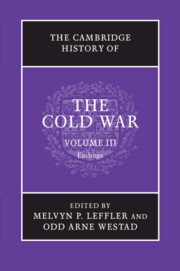Book contents
- Frontmatter
- 1 The Cold War and the intellectual history of the late twentieth century
- 2 The world economy and the Cold War, 1970–1990
- 3 The rise and fall of Eurocommunism
- 4 The Cold War and Jimmy Carter
- 5 Soviet foreign policy from détente to Gorbachev, 1975–1985
- 6 Islamism, the Iranian revolution, and the Soviet invasion of Afghanistan
- 7 The collapse of superpower détente, 1975–1980
- 8 Japan and the Cold War, 1960–1991
- 9 China and the Cold War after Mao
- 10 The Cold War in Central America, 1975–1991
- 11 The Cold War and southern Africa, 1976–1990
- 12 The Gorbachev revolution and the end of the Cold War
- 13 US foreign policy under Reagan and Bush
- 14 Western Europe and the end of the Cold War, 1979–1989
- 15 The East European revolutions of 1989
- 16 The unification of Germany, 1985–1991
- 17 The collapse of the Soviet Union, 1990–1991
- 18 Science, technology, and the Cold War
- 19 Transnational organizations and the Cold War
- 20 The biosphere and the Cold War
- 21 The Cold War and human rights
- 22 The Cold War in the longue durée: global migration, public health, and population control
- 23 Consumer capitalism and the end of the Cold War
- 24 An ‘incredibly swift transition’: reflections on the end of the Cold War
- 25 The restructuring of the international system after the Cold War
- Bibliographical essay
- Index
- References
12 - The Gorbachev revolution and the end of the Cold War
Published online by Cambridge University Press: 28 September 2010
- Frontmatter
- 1 The Cold War and the intellectual history of the late twentieth century
- 2 The world economy and the Cold War, 1970–1990
- 3 The rise and fall of Eurocommunism
- 4 The Cold War and Jimmy Carter
- 5 Soviet foreign policy from détente to Gorbachev, 1975–1985
- 6 Islamism, the Iranian revolution, and the Soviet invasion of Afghanistan
- 7 The collapse of superpower détente, 1975–1980
- 8 Japan and the Cold War, 1960–1991
- 9 China and the Cold War after Mao
- 10 The Cold War in Central America, 1975–1991
- 11 The Cold War and southern Africa, 1976–1990
- 12 The Gorbachev revolution and the end of the Cold War
- 13 US foreign policy under Reagan and Bush
- 14 Western Europe and the end of the Cold War, 1979–1989
- 15 The East European revolutions of 1989
- 16 The unification of Germany, 1985–1991
- 17 The collapse of the Soviet Union, 1990–1991
- 18 Science, technology, and the Cold War
- 19 Transnational organizations and the Cold War
- 20 The biosphere and the Cold War
- 21 The Cold War and human rights
- 22 The Cold War in the longue durée: global migration, public health, and population control
- 23 Consumer capitalism and the end of the Cold War
- 24 An ‘incredibly swift transition’: reflections on the end of the Cold War
- 25 The restructuring of the international system after the Cold War
- Bibliographical essay
- Index
- References
Summary
‘The Gorbachev revolution’ was of decisive importance in relation to the end of the Cold War. The wording itself, though, requires some elaboration. The profound changes that occurred in the Soviet Union during the second half of the 1980s were not, it goes without saying, simply the work of one man. However, reform from below, not to speak of revolution in a more conventional sense of the term, was infeasible. Not only was the system rigidly hierarchical, but it also embodied a sophisticated array of rewards for conformist behaviour and calibrated punishments for political deviance. The Communist Party was, moreover, able to devote vast resources to propagating its version of reality, especially successfully in the realm of foreign policy. Average Soviet citizens did not have the kind of personal experience which would have enabled them to call into question the story of the Soviet Union’s struggle for peace in the face of provocative acts by hostile imperialist forces.
The term ‘Gorbachev revolution’ is apt inasmuch as changes of revolutionary dimensions – especially pluralisation of the political system – occurred under Mikhail Gorbachev’s leadership and with the full weight of his authority and the power of the office of Communist Party leader behind them. The notion of revolution from above is also, though, paradoxical, for Gorbachev was by temperament a reformer rather than a revolutionary. The resolution of the paradox is to be found in Gorbachev’s pursuit of revolutionary goals by evolutionary means, phraseology he frequently used himself.
- Type
- Chapter
- Information
- The Cambridge History of the Cold War , pp. 244 - 266Publisher: Cambridge University PressPrint publication year: 2010
References
- 7
- Cited by

